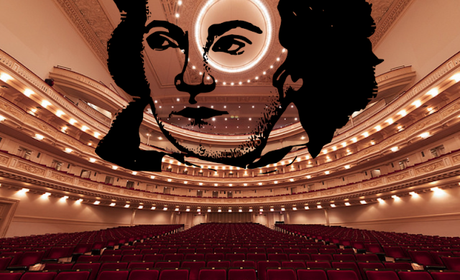by Paul J. Pelkonen

Came back haunted: the spirit of Ludwig van Beethoven visits Carnegie Hall in the 2019-2020 season.
Photo courtesy Carnegie Hall, alteration by the author.
The music of Ludwig van Beethoven, particularly the symphonies, piano sonatas and string quartets, forms the central thrust of the 2019-2020 Carnegie Hall schedule. The schedule was unveiled today at the traditional yearly press conference at the historic venue. The emphasis on Beethoven is for calendar reasons: next year marks his sestercentennial or 250th birthday. (A more cynical blog than this might also add that Beethoven's music remains an evergreen source of tickets and subscriptions, but that's not something we'd ever say in print.)
Carnegie is banking heavily on Beethoven this year, leaning on the composer's ouevre in a way that may be thrilling but also risks being merely repetitive. There are numerous all-Beethoven evenings planned, with deep dives into his choral works, sacred music and lesser known chamber works.
There are two complete cycles of Beethoven symphonies, both packed into the spring schedule. The first (Feb. 18-24, 2020) is on early instruments, with period performance expert Sir John Eliot Gardiner leading the Orchestre Révolutionnaire et Romantique. The second (March 18-April 4) is more conventional, played by the Philadelphia Orchestra under Yannick Nézet-Séguin. Both conductors are Carnegie Perspectives artists (Hall-speak for "residency") this season, and are joined in that honor by Beninese world music star Angelique Kidjo and mezzo-soprano Joyce DiDonato. (This is Ms. DiDonato's second stint as a Perspectives artist, and she is eager for what she calls "the chance for a sequel.")
There are also cycles of all LvB the piano sonatas (divided between eight very different pianists) string quartets (played by the Quatour Ébène over six concerts) and choral and orchestral works. Curiously absent is the composer's lone opera Fidelio. (When asked about this at the press conference Hall president Clive Gillinson pointed out that one cannot have everything one wants, or words to that effect.)
Below is a quick overview of the season's non-Beethoven concert offerings, or as many of them as could be extrapolated from the thick press kit. More information is of course available at carnegiehall.org.
The season opens with the Cleveland Orchestra under Franz Welser-Möst with a gala performance on Oct. 3. This is followed by a concert performance of Mahler's Fifth Symphony, paired with Trauermarsch by Jorg Widmann. Mr. Widmann is this year's composer in residence and his music peppers the season with an assortment of New York premieres and eve a lecture series.
As part of his Perspectives series, Mr. Nézet-Séguin will lead three different orchestras on the stage of Stern Auditorium. In addition to his appearances with the Philadelphia Orchestra, he brings the Orchestre Métropolitain de Montréal for their New York debut (November 22) and The MET Orchestra for two concerts in June.
The Chicago Symphony Orchestra is celebrating ten years for music director Riccardo Muti. Mr. Muti brings his forces to bear on a program featuring the Respighi showpiece The Pines of Rome and Ms. DiDonato reprising the title role in Berlioz' La mort de Cléopâtre. The second concert concentrates on Prokofiev's theatrical music, with selections from Romeo and Juliet and the Symphony No. 3, a rare bird derived from the same thematic material as the composer's phantasmagorical opera The Fiery Angel. (The composer recycled the music in 1928 after he could not get the controversial opera mounted on the stage.)
In December, Mr. Nézet-Séguin collaborates with Ms. DiDonato for a performance of Schubert's Winterreise, New York's first chance to hear the acclaimed conductor at the piano. Another Winterreise is planned for Jan. 31 with Peter Mattei leading listeners on the journey of Schubert songs. Other song recitalists this year include Sir Bryn Terfel, Gerald Finley, Ian Bostridge, Renée Fleming and Pretty Yende.
Harry Bickett continues his deep dive into the operas of Handel with Rodelinda, the latest in a series that (Mr. Gillinson quipped) "will go on for another hundred years." Also, Mariss Jansons and the Boston Symphony Orchestra bring another installment of Wagner's Tristan und Isolde, in this case the third act, starring German tenor and operatic heartthrob Jonas Kaufmann in one of the longest death scenes in opera. Emily Magee is his Isolde.
Piano music is well represented. In addition to recitals by Daniil Trifonov, Behzod Abduraimov, Yuja Wang and Marc-Andre Hamelin, there is the above-mentioned cycle of eight recitalists playing all the Beethoven sonatas. (It always comes back to Beethoven!)
The season ends in late June, with three orchestral concerts by the Vienna Philharmonic under the leadership of Daniel Barenboim. Mr. Barenboim will conduct three Mahler symphonies, the Fifth, the Seventh and the Ninth.
If you enjoyed this article, it's time to click over to Superconductor's Patreon page, and help support the cost of independent music journalism in New York City at the low cost of just $5/month.

